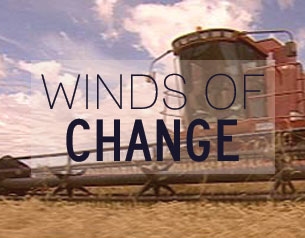Winds of Change
 On the flat yellow plains surrounding Birchip, in north-western Victoria, drought is a familiar if detested visitor that always overstays.
The farmers and townsfolk of Birchip have seen little of the rains that have flooded other parts of Australia. It's likely to stay that way. For Birchip is bang in the middle of the swathe of southern Australia that is forecast to dry out as temperatures rise, cutting farm production by as much as 10 per cent in the next 20 years. Some farms in now productive areas may become marginal; small farms on marginal lands could become unviable, eventually being swallowed up by bigger operators or abandoned to nature.
On the flat yellow plains surrounding Birchip, in north-western Victoria, drought is a familiar if detested visitor that always overstays.
The farmers and townsfolk of Birchip have seen little of the rains that have flooded other parts of Australia. It's likely to stay that way. For Birchip is bang in the middle of the swathe of southern Australia that is forecast to dry out as temperatures rise, cutting farm production by as much as 10 per cent in the next 20 years. Some farms in now productive areas may become marginal; small farms on marginal lands could become unviable, eventually being swallowed up by bigger operators or abandoned to nature.
Around Birchip, farmers are increasingly doing it tough. Four Corners goes there to track the shifting fortunes of five farming families as they face the vagaries of drought and the new reality of climate change.
Some farmers here eke out a small profit or break even. Others traipse off to their bank managers, digging deeper into debt, hoping that the next hand deals them a good season. "You just get sick of borrowing, borrowing, borrowing," one tells Four Corners.
It's a cruel game of calculating and maximising odds - should they forward sell the crop now or punt on the price rising later? Will computer modelling of their soils boost their yields? Can they hang in long enough to rack up a few good years and offset the bad?
"(The bad years) have been character-building," says farmer Anne McClelland, her humour dry as the paddock, "but I didn't really want my character built in that way."
McClelland, her husband and her neighbours know that survival is not only about getting enough rain at the right time, or getting government aid if it doesn't. It is a Darwinian process that relies increasingly on technological adaptation to drought. Climate change threatens to sort losers from winners.
Filmed over several months as seasons change and their hopes rise and fall, farmers in this Four Corners program agree that climate change is real - but for most of them it is not quite here and not right now. They see this dry as just a natural climate variation, not a creature of climate change - and no one can prove they are wrong.
"We wouldn't be farmers unless we were optimists," says John Ferrier. Others wonder how long it can last. "We've probably produced off this land enough food, fibre, meat to feed many, many hundreds of thousands of people," says one veteran about his district, "and we have dust storms and all that sort of thing and I think we're just pushing this land too hard trying to stay afloat financially."
As Four Corners reveals, if climate change does force these small farmers from the land, bigger operators - including secretive international players with hundreds of millions at their disposal - are waiting at the front gate.
FULL SYNOPSIS
